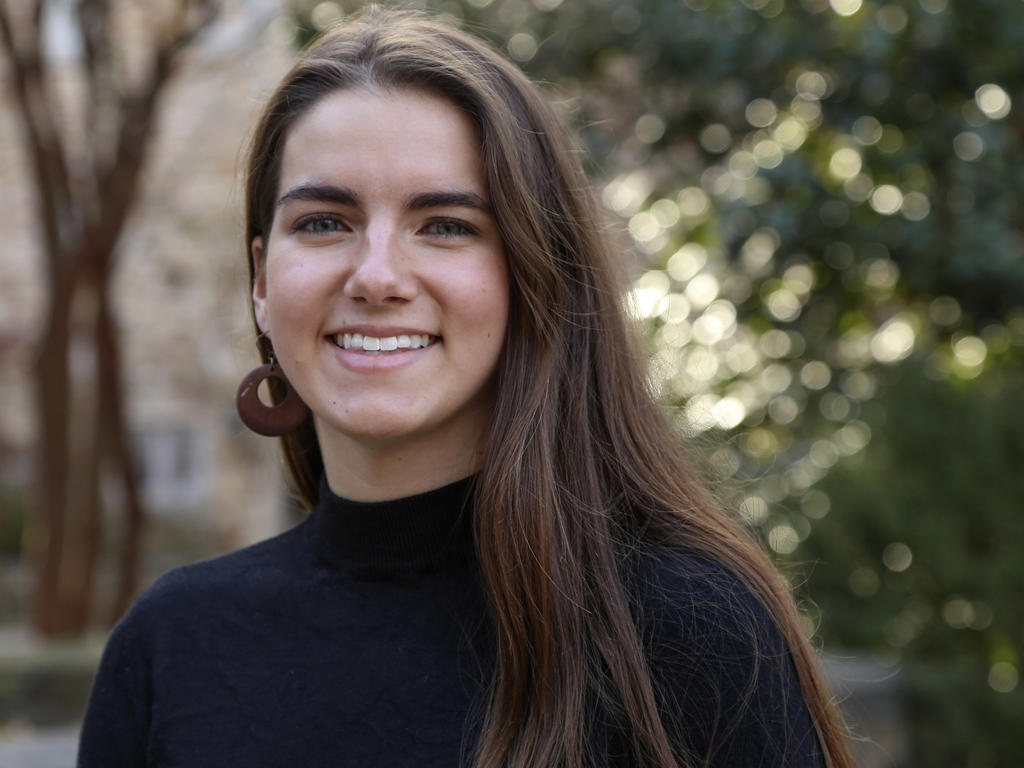When Helen Hope ’18 from Little Rock, AR, looks back on her childhood, she recalls a strong love for the outdoors. “We went hiking, camping, fishing, canoeing, you name it. Growing up, I remember my dad creating scavenger hunts to teach us how to use a compass. What started as a passion for the natural world has expanded since coming to Rhodes—I think of the natural world more in relation to its human counterpart, and how the two interact. A lot of that has come from working in an urban forest—nature surrounded by humans.”
Hope is referring to her work as an Urban Forestry Fellow with the Department of Environmental Studies. The fellowship is part of a collaborative research program between Rhodes and the Overton Park Conservancy (OPC), which was created by Dr. Kimberly Kasper, assistant professor of anthropology, and Eric Bridges, director of operations at the OPC. The fellowship is focused mainly on the study of the Old Forest State Natural Area in Overton Park, a unique resource located right across the street from campus.
“We do different projects to help better manage the forest," says Hope, who has been a fellow since 2016. "My first summer, I did a forest regeneration dynamic study. That work will help the park staff when they are thinking about future management plans for the park.”
Hope, who is also the president of her sorority, a peer assistant, Rhodes Diplomat, and Rhodes Singer, is currently working on multiple projects for her fellowship. “The bulk of my work this semester has been focused on the recertification of the arboretum on campus. I created a virtual map of all the trees, made labels, placed them, and worked closely with the communications office to make a brochure with a self-guided tour (www.rhodes.edu/content/rhodes-arboretum). My fellow partner, Maddie Smith, and I also have been designing a survey looking at accessibility in Overton Park.”
Hope is a double major in environmental studies and economics, and throughout her time at Rhodes has found ways to make connections between her majors. She explains, “Economics drives our society and the ‘nature-human’ interaction. It reveals how people consume and produce–whether that’s buying goods like a t-shirt or producing CO2 pollution. By understanding how the economy works, I can better navigate environmental ideas and problems and how they all relate.” Her interest and double major have prompted the faculty to teach a course in environmental economics.
Although she is not sure of the work she’ll be doing upon graduation, Hope has thought about working in either environmental law or at a non-profit. She says she is excited to see how she can apply the skills gained in the past two years.
“I’ve gotten the opportunity to attend Memphis City Hall meetings and a Memphis non-profit summit, speak at an OPC fundraising event, and spent hours walking through the Old Forest. I’ve learned how to implement a research project, and all the problem-solving skills that come with that,” says Hope. “Most of what I am taking away from this fellowship I owe to my supervisors. Eric Bridges has mentored me not only in the deep set of forestry knowledge he holds, but in how to cultivate relationships in the non-profit community. Working with Professor Kasper has shaped me to hold a more proactive work ethic and an intersectional perspective on everything I do. I am deeply grateful for their investment in this fellowship program, and through it, in me.”
By Ellie Johnson ’20
